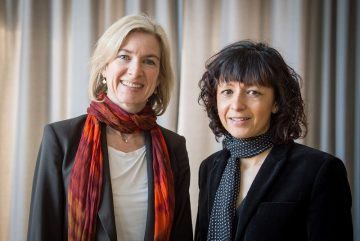Callaway and Ledford in Nature:
 It’s CRISPR. Two scientists who pioneered the revolutionary gene-editing technology are the winners of this year’s Nobel Prize in Chemistry. The Nobel Committee’s selection of Emmanuelle Charpentier, now at the Max Planck Unit for the Science of Pathogens in Berlin, and Jennifer Doudna, at the University of California, Berkeley, puts to rest years of speculation as to who would be recognized for their work developing the CRISPR–Cas9 gene-editing tools. The technology has swept through labs worldwide and has countless applications: researchers hope to use it to alter human genes to eliminate diseases, create hardier plants, wipe out pathogens and more.
It’s CRISPR. Two scientists who pioneered the revolutionary gene-editing technology are the winners of this year’s Nobel Prize in Chemistry. The Nobel Committee’s selection of Emmanuelle Charpentier, now at the Max Planck Unit for the Science of Pathogens in Berlin, and Jennifer Doudna, at the University of California, Berkeley, puts to rest years of speculation as to who would be recognized for their work developing the CRISPR–Cas9 gene-editing tools. The technology has swept through labs worldwide and has countless applications: researchers hope to use it to alter human genes to eliminate diseases, create hardier plants, wipe out pathogens and more.
Several other scientists, in addition to Charpentier and Doudna, have been cited — and recognized in other high-profile awards — as key contributors in the development of CRISPR. They include Feng Zhang at the Broad Institute of MIT and Harvard in Cambridge, Massachusetts, George Church at MIT and biochemist Virginijus Siksnys at Vilnius University in Lithuania. Doudna was “really sound asleep” when her buzzing phone woke her and she took a call from a Nature reporter, who broke the news. “I grew up in a small town in Hawaii and I never in a hundred million years would have imagined this happening,” says Doudna. “I’m really stunned, I’m just completely in shock.” “I know so many wonderful scientists who will never receive this, for reasons that have nothing to do with the fact that they are wonderful scientists,” Doudna says. “I am really kind of humbled.”
More here.
